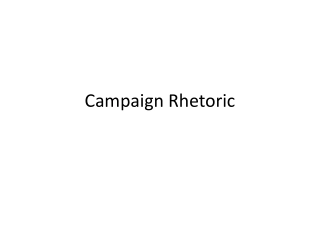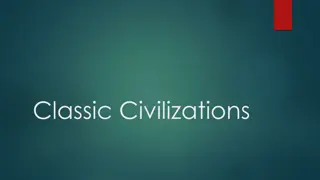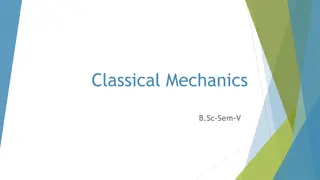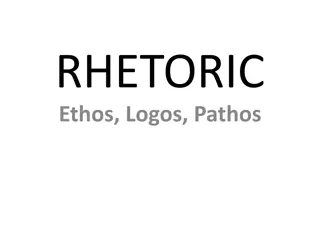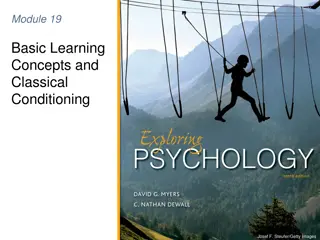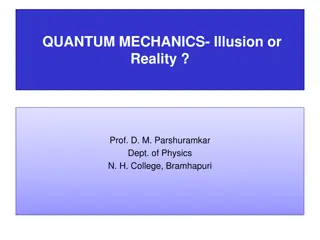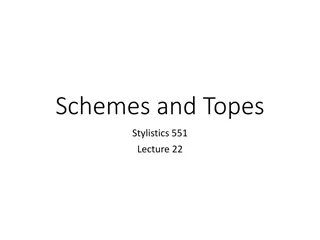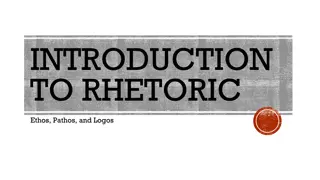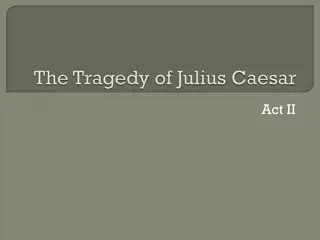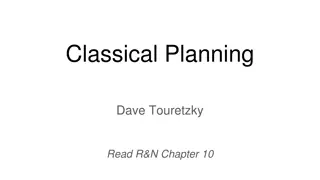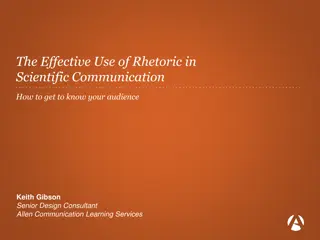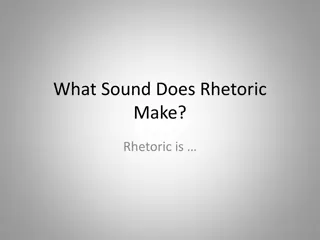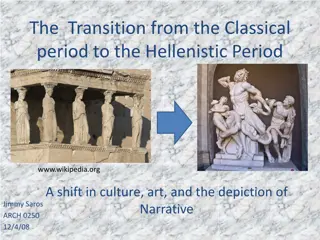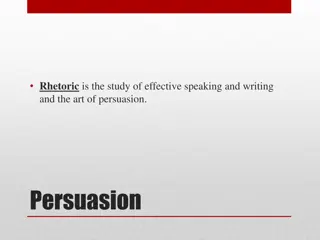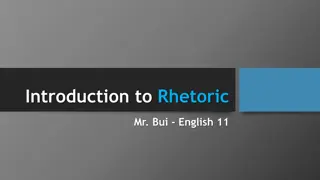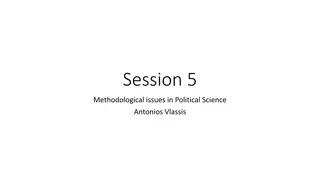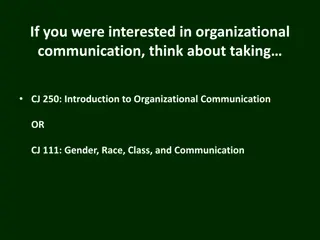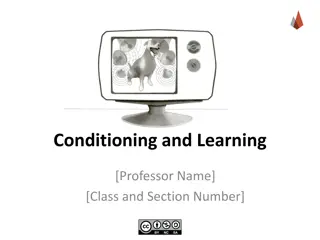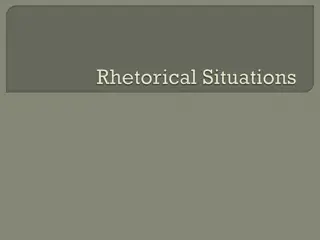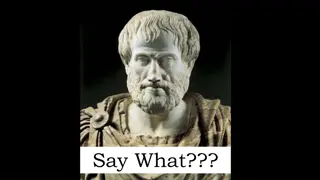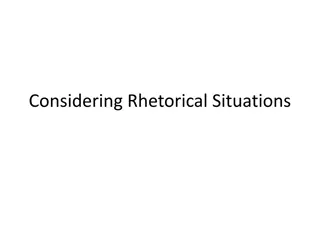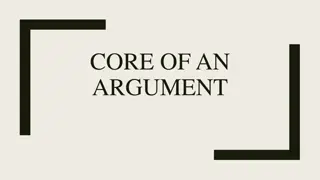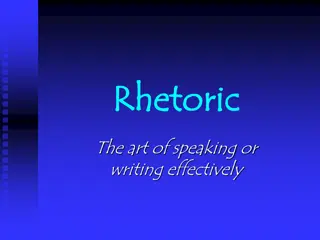Campaign Rhetoric
Rhetoric, the art of persuasive language use, plays a crucial role in political campaigns, focusing on public speaking to sway audience opinions. The ethical implications, such as the use of noble ideas versus dishonest strategies, are also key considerations. Factors affecting persuasiveness includ
0 views • 51 slides
Evolution of Management Theories: Classical Approach and Scientific Management
Explore the evolution of management theories focusing on the Classical Approach and Scientific Management. The Classical Approach emphasizes efficiency and specialization, while Scientific Management introduced systematic methods to increase productivity. Learn about key figures like Frederick Winsl
6 views • 31 slides
Understanding Classical Civilizations: Timeline Analysis and Periodization
Explore the concept of periodization by creating a timeline of significant life events and categorizing them into distinct periods. Learn about classical civilizations, time periods, and the process of dividing history into eras. Dive into the Classical Age and its contributions to human development
1 views • 24 slides
Understanding Classical Mechanics: Variational Principle and Applications
Classical Mechanics explores the Variational Principle in the calculus of variations, offering a method to determine maximum values of quantities dependent on functions. This principle, rooted in the wave function, aids in finding parameter values such as expectation values independently of the coor
0 views • 16 slides
Diverse Music Traditions of India - Classical to Folk
Explore the rich musical heritage of India, encompassing classical Carnatic and Hindustani music, folk melodies, film songs, and pop music. Learn about the intricate nuances of Indian classical music, its historical evolution, and the variety of genres within the music landscape of the country.
0 views • 8 slides
Understanding Rhetoric: Ethos, Logos, Pathos in Persuasion
Rhetoric explores the art of persuasive communication, emphasizing three key components: Ethos (credibility), Logos (logic/facts), and Pathos (emotion). Understanding the three types of rhetoric and persuasive appeals can enhance one's ability to craft compelling arguments. Through examples, student
0 views • 10 slides
Examples of Classical and Operant Conditioning
Robert receiving a ticket for driving under the influence illustrates operant conditioning with negative punishments, while Chris being afraid of dogs after being bitten showcases classical conditioning with stimulus generalization. Jacob's joy from smelling his date's cologne demonstrates classical
1 views • 9 slides
Understanding Basic Learning Concepts and Classical Conditioning
Acquiring new information and behaviors through experience is known as learning. One common way we learn is through associative learning, where we connect certain events together. This process can take the form of classical conditioning, where stimuli evoke automatic responses, or operant conditioni
1 views • 14 slides
Exploring Quantum Mechanics: Illusion or Reality?
Delve into the fascinating realm of quantum mechanics with Prof. D. M. Parshuramkar as he discusses the contrast between classical and quantum mechanics. Discover how classical mechanics fails to predict the behavior of electrons in atoms and molecules, leading to the development of quantum mechanic
1 views • 70 slides
The Art of Rhetoric and Persuasion: A Journey from Greece
The history of rhetoric and the concepts of persuasion trace back to ancient Greece with prominent figures like Aristotle and Plato. Aristotle's book, "The Art of Rhetoric," introduced the three methods of persuasion - Pathos, Logos, and Ethos. Pathos appeals to emotions, Logos involves logic and re
0 views • 25 slides
Unveiling the Intricacies of Schemes and Tropes in Stylistics
Schemes and Tropes in classical rhetoric play a vital role in enhancing written and spoken language by deviating from literal expressions. These stylistic devices, known as figures of speech, add depth, beauty, and emotional intensity to communication. Schemes involve repetitions of expression, whil
0 views • 19 slides
Understanding Rhetoric: Ethos, Pathos, Logos
Rhetoric is the art of persuasive communication in various contexts. It involves utilizing ethos (credibility), pathos (emotions), and logos (logic) to influence the audience. Distinguishing between argument and persuasion, this communication form employs elements such as organization patterns, appe
4 views • 18 slides
Comparative Study of Apprenticeship Systems in England, Finland, and France
This comparative study explores the rhetoric and reality of apprenticeship systems in England, Finland, and France for 16-18 year-olds. It delves into the policy motivations behind researching apprenticeships and examines the roles of employers within these programs. The study also defines apprentic
3 views • 13 slides
Understanding Rhetoric and Characterization in Shakespearean Works
Delve into the realm of rhetoric, exploring the concepts of logos, pathos, and ethos alongside the art of persuasion through language. Uncover the nuances of blank verse in Shakespearean poetry and the significance of characterization in revealing the depths of characters in his plays.
7 views • 32 slides
Understanding Classical Planning in Artificial Intelligence
Classical planning in AI involves problem-solving with defined states, actions, preconditions, and effects. This text explores the concept of planning, classical planning characteristics, and provides examples such as the rocket problem with optimal and suboptimal plans.
0 views • 38 slides
The Rhetoric of Death in Central Appalachia: A Case Study in Rhetorical History
Explore the role of rhetoric in Central Appalachia's material culture through traditional gravestones, studying beliefs and values using artifacts, semiotics, and the evolution of cemetery symbolism over time. Discover how codes on graves convey messages on death and grief within the Appalachian con
0 views • 9 slides
Mastering Rhetoric in Scientific Communication
Understanding and utilizing rhetoric effectively in scientific communication is essential for engaging audiences. By knowing your audience, employing Aristotelian reasoning, and building metaphors, you can enhance the impact of your message. Additionally, storytelling plays a crucial role in captiva
0 views • 22 slides
Insights into Indian Classical Drama and Literature
Explore the rich tradition of Indian classical drama and literature, from its origins in Ujjain during the Gupta period to the classification of major and minor dramas. Learn about the components of a classical Sanskrit drama, such as the plot, characters, sentiments, acting, and more. Delve into th
1 views • 9 slides
Understanding the Art of Rhetoric
Explore the diverse perspectives on the concept of rhetoric, ranging from Plato and Aristotle to modern thinkers like Henry Ward Beecher and Andrea Lunsford. Rhetoric is depicted as the art of persuasion, with various scholars defining it as enchanting the soul, discovering means of persuasion, or i
1 views • 13 slides
Department of Writing and Rhetoric Writing Excellence Awards 2011
The Department of Writing and Rhetoric at Oakland University organized the Writing Excellence Awards in 2011, recognizing outstanding submissions across various categories including writing from/about sources, original research, visual and/or auditory composition, fiction, and creative nonfiction. T
1 views • 42 slides
Classical Conversations Plus Program Overview
Explore Classical Conversations Plus program partnership opportunities, including the SEU partnership for homeschool students in grades 11-12. Learn about the administrative team, benefits, courses, and the Classical Christian education background rooted in the Western tradition. Discover how parent
0 views • 11 slides
Transition from Classical to Hellenistic Period: Art and Narratives
The evolution from the Classical period to the Hellenistic period in Ancient Greece brought significant shifts in culture, art, and storytelling. Classical art focused on idealized human forms and naturalistic poses, while Hellenistic art embraced more dramatic expressions and emotions. The narrativ
0 views • 23 slides
Understanding Rhetoric and Persuasion Techniques
Rhetoric is the art of effective speaking and writing, encompassing persuasion techniques like PATTR analysis, Aristotelian appeals (Pathos, Logos, Ethos), and understanding speaker-audience dynamics. Logos appeals to logic, Ethos to ethics, and Pathos to emotions, with an important focus on audienc
0 views • 18 slides
Understanding Rhetoric in College Writing
Exploring the significance of rhetoric in college writing, this content highlights the essence of situated communication, rhetorical situations, and the use of various devices in analyzing texts such as political speeches and hip-hop culture. It emphasizes the importance of understanding author purp
0 views • 11 slides
Understanding Vacuum Fluctuations in Quantum and Classical Physics
Explore the intriguing concept of vacuum fluctuations in both classical and quantum physics, delving into their experimental effects and significance. From classical interpretations of empty space to quantum field theory's zero-point fluctuations, discover how vacuum properties influence particle in
0 views • 38 slides
Quantum vs. Classical Computing: Exploring Forrelation Problem
Delve into the world of quantum and classical computing with the Forrelation problem that optimally separates the two realms. From Fourier correlations to quantum algorithms and classical lower bounds, explore the intricacies of distinguishing between quantum and classical computation through variou
0 views • 29 slides
Unveiling the Art of Rhetoric: A Comprehensive Guide for English 11 Students
Delve into the world of rhetoric with Mr. Bui as your guide in English 11. Explore the definition, background, and significance of rhetoric, along with key concepts such as SOAPStone, the Rhetorical Triangle, and the Rhetorical Appeals (Ethos, Logos, Pathos). Learn how Aristotle laid the foundation
0 views • 24 slides
The Logical Structure of Classical and Quantum Mechanics
The paper explores the common logical structure shared between classical and quantum mechanics, emphasizing the non-distributive lattice embedded in a distributive one. It discusses how all physical theories must adhere to this structure, incorporating topology, Heyting algebra, Boolean algebra, and
1 views • 36 slides
Basics of Learning: Classical and Operant Conditioning Overview
Types of learning include classical conditioning, operant conditioning, and observational learning. Classical conditioning involves pairing a neutral stimulus with a meaningful one to elicit a response. Operant conditioning focuses on how consequences influence behavior. Terminology like UCS, UCR, N
0 views • 66 slides
Understanding Classical Marxism: Key Concepts and Critiques
Marxism, rooted in the ideas of Karl Marx, emphasizes the significance of economic relations in shaping social and political structures. Classical Marxism focuses on economism, determinism, materialism, and structuralism, viewing history through a lens of class struggle and offering an emancipatory
0 views • 21 slides
Exploring Classical Mechanics in Physics
Delve into classical mechanics with topics ranging from helicopter dynamics and bicycle dynamics to inclined planes and the principles of Newton's laws of motion. Learn about the unique characteristics of instruments like the pianoforte and the foundational principles governing linear and angular mo
0 views • 14 slides
Understanding Rhetoric and Organizational Communication
Delve into the world of rhetoric by exploring how symbols influence and persuade audiences. Discover the various applications of rhetoric in different fields like speech writing, public relations, and advertising. Analyze the impact of Disney on shaping childhood culture and imagination. Uncover the
0 views • 35 slides
Understanding Classical Conditioning: Pavlov's Experiment and Responses
Explore the principles of classical conditioning through Pavlov's experiment, including the types of responses like conditioned emotional reactions. Learn about the components of classical conditioning such as unconditioned stimulus and response, conditioned stimulus and response, and how the proces
0 views • 42 slides
Understanding Rhetoric: Aristotle's Three Means of Persuasion
Rhetoric, as Aristotle defined it, is the art of persuasion through available means. This involves utilizing logos (logic), pathos (emotions), and ethos (trustworthiness) to influence an audience. Writing serves various purposes like self-exploration, communication, entertainment, record-keeping, or
0 views • 16 slides
Understanding Rhetoric: History, Techniques, and Applications
Explore the world of rhetoric through an engaging journey covering its origins, key figures, techniques like anaphora, and practical applications in persuasive speaking and writing. Discover how rhetoric influences everyday communication and empowers individuals to articulate arguments effectively.
0 views • 8 slides
Exploring Rhetoric: Understanding the Art of Persuasion and Communication
Delve into the world of rhetoric through insightful discussions on what rhetoric entails, its ethical implications, and the importance of listening and synthesis in college writing. Uncover the power of language and persuasion as a means of effective communication and critical thinking in academic c
0 views • 22 slides
Crafting a Persuasive Classical Argument
Crafting a persuasive classical argument involves following a structured approach that includes grabbing the reader's attention in the introduction, presenting the writer's position with reasons and evidence, summarizing and critiquing alternative views, and concluding with a strong final impression
0 views • 30 slides
Understanding Conservation Principles in Fluid Dynamics and Classical Mechanics
Conservation principles play a significant role in fluid dynamics and classical mechanics. In fluid dynamics, conservation of mass, momentum, and energy are crucial for understanding fluid behavior. Classical mechanics, on the other hand, relies on Newton's laws to describe motion and energy conserv
0 views • 46 slides
Mastering the Art of Rhetoric: Ethos, Logos, and Pathos
Delve into the world of rhetoric with a focus on ethos, logos, and pathos. Explore the significance of ethos in establishing credibility, logos in using logic and evidence, and pathos in appealing to emotions. Uncover how these elements play a crucial role in effective communication and persuasion a
0 views • 20 slides
Evolution of Photoionization Studies: From Classical Predictions to Quantum Triumph
Tracing the journey of photoionization studies from classical predictions to experimental rejections, quantum interpretations by Einstein, and current understanding through a classical approach. Highlighting key experiments, laws of photoeffect, and limitations faced in describing strong field situa
0 views • 47 slides
